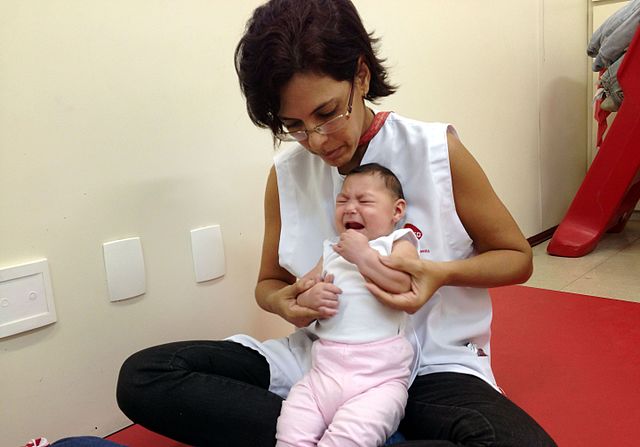
Baby with microcephaly, born to a mother infected with the Zika virus (Agencia Brasil, Wikimedia Commons)
9 Jan. 2019. A clinical trial is enrolling participants testing a vaccine to prevent Zika infections with synthetic DNA particles designed to produce antibodies against the virus. The study is conducted by University of Pennsylvania, testing the vaccine derived from research by the Wistar Institute and developed by biotechnology company Inovio Pharmaceuticals Inc., all in or near Philadelphia.
The Zika outbreak is a current public health challenge, with cases in Brazil spreading to the Caribbean and the Americas, including the U.S. mainland. The Zika virus is transmitted primarily by aedes aegypti mosquitoes, the same species carrying chikungunya, dengue, and yellow fever pathogens. The virus may also be spread through sexual contacts. Most people contracting the Zika virus report symptoms such as mild fever, conjunctivitis or pink eye, and muscle and joint pain.
Recent Zika outbreaks, however, are resulting in more cases of birth defects, notably microcephaly and Guillain-Barré syndrome. Centers for Disease Control and Prevention, as of early January 2019, counts more than 5,700 Zika cases in the 50 U.S. states and District of Columbia, and 37,300 cases in U.S. territories. Nearly 2,500 pregnant women in the U.S. states and D.C. are reported with Zika, as well as more than 4,900 women in U.S. territories.
Researchers led by immunologist David Weiner, director of the Wistar Institute’s Vaccine Center, are seeking faster and easier methods to make vaccinations protecting against Zika and other infectious diseases. The institute is developing a technology that Inovio Pharmaceuticals licensed from Weiner’s lab while he was at University of Pennsylvania. In this process, called DMab — short for DNA monolclonal antibody — DNA fragments are ingested into cells, where they’re exposed to 3 to 4 mild electrical pulses, which Inovio calls its Cellectra system, increasing the uptake of DNA to generate more antibodies. Weiner is a scientific adviser to Inovio.
“DMAb technology is changing the clinical story as we know it,” says Weiner in a joint statement. “In just the last few years we’ve conducted detailed preclinical studies developing this new platform and have demonstrated in vivo production of DMAbs using the Cellectra delivery system.”
The clinical trial is an early-stage study testing the safety and dose-tolerability of a DNA vaccine against Zika. The study, led by virologist and infectious disease specialist Pablo Tebas at University of Pennsylvania, is recruiting 24 healthy volunteers to receive up to 4 doses of the vaccine, code-named INO-A002 by Inovio. In November 2018, Science & Enterprise reported on a similar DMab vaccine developed by Wistar and Inovio in preclinical testing to protect against Ebola infections.
“This is a completely novel technology that could change the way we deliver antibodies as therapeutic agents and may have the potential to be fast-tracked into clinical trials,” notes Tebas. “While there are still questions to be answered, this could be useful not only for Zika, but for other emerging infections as well.”
Other synthetic antibodies from DNA are being tested to protect against Zika infections. As reported in Science & Enterprise in April 2017, a Zika vaccine with genetically-engineered DNA is being tested in a mid-stage trial conducted by National Institute of Allergy and Infectious Diseases, part of National Institutes of Health. This technology genetically alters a circular piece of DNA found in bacteria and other microorganisms called a plasmid, then adding Zika genes from the surface of the virus. The result is a particle resembling the Zika virus enough to produce antibodies, but not an infection.
More from Science & Enterprise:
- Antibiotic Prevents Staph Colonies in Newborns
- Chip Device to Test Gut Infections on Space Station
- Infographic – HIV Infections Growing in Eastern Europe
- Infographic – Greatest Human Health Risks
- Biotechs to Develop Personal Cancer-Killing Virus Vaccines
* * *

 RSS - Posts
RSS - Posts
[…] Trial Testing DNA Antibody Vaccine for Zika […]